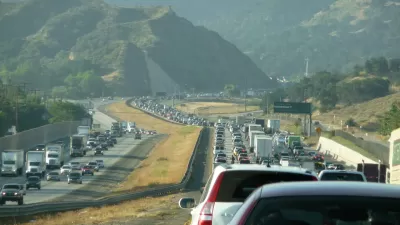Thirty years ago Peter Newman and Jeff Kenworthy introduced the concept of automobile dependency. In this article they reexamine the evidence, consider criticisms, and discuss how their insights changed—sometimes painfully—planning practices.

The abstract for "Gasoline Consumption and Cities Revisited: What Have We Learnt?":
This article provides a personal reflection 30 years after we created the concept of automobile dependence. The paper entitled “Gasoline Consumption and Cities: A Comparison of US Cities with a Global Survey and Its Implications” and an associated book “Cities and Automobile Dependence” stirred up transport planning, especially in the US. We examine the criticisms, [sic] this evoked at the time within the perspective of what has happened in cities since then. Key policy prescriptions of re-urbanizing cities and prioritizing transit, walking and cycling, [sic] have been largely mainstreamed, though not without some painful changes in professional practice such as road capacity increases being seen as the only solution to traffic. Urban planning and transport policies adopted in innumerable cities worldwide have moved to reduce automobile dependence, though academic and policy debate continues. The future is likely to continue this debate, especially over autonomous cars where there will remain a fundamental need to keep cities on a path of reduced automobile dependence by ensuring that hard-won principles of reurbanization of corridors, integrated with new transit alternatives and walkability at precincts/stations, are given the highest priority.
The entire study, published in Vol.9 No.3, September 2021 of the Current Urban Studies journal, is available with open access at the link below.
FULL STORY: Gasoline Consumption and Cities Revisited: What Have We Learnt?

Maui's Vacation Rental Debate Turns Ugly
Verbal attacks, misinformation campaigns and fistfights plague a high-stakes debate to convert thousands of vacation rentals into long-term housing.

Planetizen Federal Action Tracker
A weekly monitor of how Trump’s orders and actions are impacting planners and planning in America.

San Francisco Suspends Traffic Calming Amidst Record Deaths
Citing “a challenging fiscal landscape,” the city will cease the program on the heels of 42 traffic deaths, including 24 pedestrians.

Defunct Pittsburgh Power Plant to Become Residential Tower
A decommissioned steam heat plant will be redeveloped into almost 100 affordable housing units.

Trump Prompts Restructuring of Transportation Research Board in “Unprecedented Overreach”
The TRB has eliminated more than half of its committees including those focused on climate, equity, and cities.

Amtrak Rolls Out New Orleans to Alabama “Mardi Gras” Train
The new service will operate morning and evening departures between Mobile and New Orleans.
Urban Design for Planners 1: Software Tools
This six-course series explores essential urban design concepts using open source software and equips planners with the tools they need to participate fully in the urban design process.
Planning for Universal Design
Learn the tools for implementing Universal Design in planning regulations.
Heyer Gruel & Associates PA
JM Goldson LLC
Custer County Colorado
City of Camden Redevelopment Agency
City of Astoria
Transportation Research & Education Center (TREC) at Portland State University
Jefferson Parish Government
Camden Redevelopment Agency
City of Claremont





























